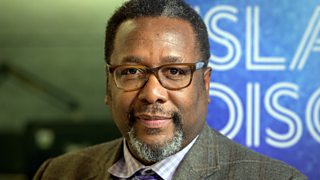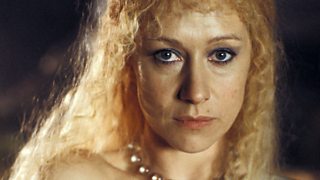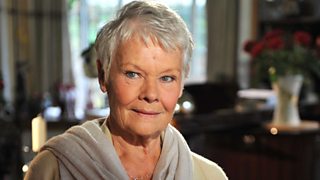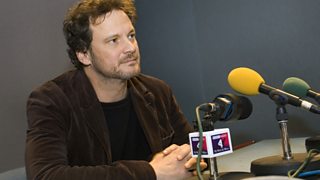Eight things we learned from Alan Cumming's Desert Island Discs
Alan Cumming is an actor who has never been out of work. His wide-ranging career on stage includes Hamlet, starring opposite Daniel Radcliffe in Samuel Beckett’s Endgame and – perhaps most notably - playing the Emcee in the musical Cabaret in London and New York to great acclaim. He’s also appeared in films including GoldenEye and Stanley Kubrick’s Eyes Wide Shut, and in the TV series The Good Wife.
He’s recorded albums and published a novel and three memoirs: his 2014 autobiography Not My Father’s Son detailed his very difficult relationship with his violent, bullying father. He’s now also the co-owner of a bar, Club Cumming, in Manhattan.
Here’s what we learned from his Desert Island Discs:
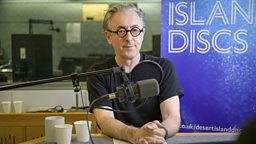
1. In his first job, he interviewed a musical duo he’s chosen for the island
Before going to drama school and starting a career as an actor, Alan worked for DC Thomson, the Dundee-based publishers of newspapers, comics and magazines including The Beano and Jackie.
Alan recalls that his duties as a sub-editor included writing the horoscopes for evening papers and a stint on a new music and TV magazine called TOPS. Alan had to interview pop stars, but “there was only one phone in this whole magazine. The editor had his own phone, but we all shared a phone on the window-sill, and we were only allowed to use it after 1pm because the calls were cheaper.”
One of his off-peak interviews was with the pop vocal duo Dollar, and Alan has chosen their 1982 hit Give Me Back My Heart as one of his eight discs – and he doesn’t hold back when he introduces it: “this is the best perfect pop song ever made, ever sung, ever written, ever produced!” He’s the first castaway to choose a track by Dollar.
2. He had a difficult childhood, living in the shadow of an abusive father
Alan recalls how his early years were dominated by his father, who would bully him physically and emotionally. He describes how his father could suddenly turn against him: “I could tell by the clack of his boots, I could tell by the way he opened the door... often it would be to do with my appearance or my hair.”
“He was obsessed by my hair,” Alan continues. “It would start off [with] ‘you need a haircut!’ and go from that to him dragging me by the collar outside into a shed, getting sheep shears out of a drawer and just shearing my head. He seemed to get great pleasure from hurting me.”
Alan felt that he had to keep this a secret within his family: “You're so ashamed of what's happening to you that you actually go out of your way, not just to pretend to yourself and but pretend to other people,” and he didn’t speak to anyone about what was happening.
3. Music offered an escape during his bleak teenage years at home
One of Alan’s chosen tracks is by a singer and songwriter who was “a complete inspiration to me, and completely a light in this darkness, because I would listen to her albums and think: ‘Oh there are fascinating, weird people out there and I'm not as bonkers and unusual as I thought.’”
The song is L'Amour Looks Something Like You by Kate Bush, from her 1978 album The Kick Inside.
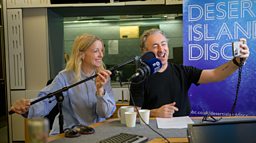
4. A student double-act launched his career – and led to a TV show
At the Royal Scottish Academy of Music and Drama, Alan teamed up with Forbes Masson to create a comedy act for a college cabaret evening.
They wore dark double-breasted blazers and cravats and called themselves Victor and Barry, “founder members of the Kelvinside Young People’s Amateur Dramatic Arts Society... the foremost amateur musical company in the whole of Scotland, if not Glasgow.”
Alan recalls that the comedy and music act “went really well and then we started to do them a wee bit outside of college and then shortly after it was insane - they became huge.”
Alan and Forbes later created an airline-based TV sit-com, The High Life, based on the characters: “Of all the things I've done in all the years I've been working, when I come back to England... and especially in Scotland, [it’s the show] that people stop me and talk about and still say ‘Is there going to be another series’? It was 25, 30 years ago – it's not going to happen!”
5. He said "no" when first offered a career-defining stage role
Alan has played the role of Emcee in the musical Cabaret with enormous success first in the 1990s in London and New York and again 20 years later. His 1998 Broadway performance won him seven awards, including a Tony.
Yet when director Sam Mendes first approached him, Alan was playing Hamlet and turned him down. He recalls: “[I said] No – no. I don’t do musicals - because I was just a little snobby dopey boy. Musicals were seen then as a bit more frilly and frothy, and I certainly felt like that too.”
Alan changed his mind after hearing more about Sam’s vision for the show, evoking “what it was like to live in that time [the 1930s] and those dingy, dark sex clubs with a band.”
6. Many years later he confronted his father about his abusive behaviour
Alan and his older brother Tom decided that they should return to their childhood home and talk to their father about what happened when they were young: “We just told him why we were there. We told him that we remembered all these things. We tried to ask him what he remembered... and we reached out to him and said we still wanted him to be in our lives, but for that to happen he would need to make an effort, acknowledge what was going on and try to heal with us.”
I do that sometimes in my life, I do things that I think I might fail at. I think that's what keeps you vital
“And he never got in touch with us again. Then at the end, when he walked away, I think he had a tear in his eye. And then we walked to the car, and we got in and we were both just shaking... I'd faced my monster and I felt so much more courageous than him. That is some succour and comfort. I have to say.”
7. He enjoys music which provokes a strong reaction
“Music is a very emotional thing,” Alan says. “I don't just like music in the background. My criteria for liking anything in the arts... is gasping. If something makes me gasp, I think that's an amazing thing to do. You've made me have this experience, my body has had this unwitting, visceral sort of reaction, even if the thing is bad - if I'm gasping, I think that's pretty good, you've made me feel alive in some way.”
8. His next show examines the life of Scotland’s national poet – in dance
This summer Alan returns to the stage in Scotland with a brand new show inspired by Robert Burns, which focuses on his difficult personal life as well as his success as a writer.
Alan says the show came about almost by chance: “When I was doing Cabaret the last time on Broadway, I turned 50 during it... At the end of the run I just thought, ‘Oh, this is it. Nobody is going to ask me to do this again. I'll never be this fit. I'll never dance this way.’ And it made me feel really sad.”
“And I thought ‘I've got one more thing in me.’ And I put that out to the universe.”
The result is that Alan is starring in a solo dance theatre piece called Burn, co-produced by the National Theatre of Scotland, the Edinburgh Festival, and the Joyce Theatre in New York.
“It's going to be really challenging... I do that sometimes in my life, I do things that I think I might fail at. I think that's what keeps you vital.”

More Desert Island Discs
-
![]()
Wendell Pierce
The actor shares his castaway musical choices.
-
![]()
The academy award-winning actress spoke to Roy Plomley in 1982.
-
![]()
The Oscar-winning actress was Kirsty Young's castaway in 2015.
-
![]()
The multii-award-winning actor was interviewed by Sue Lawley in 2005.

